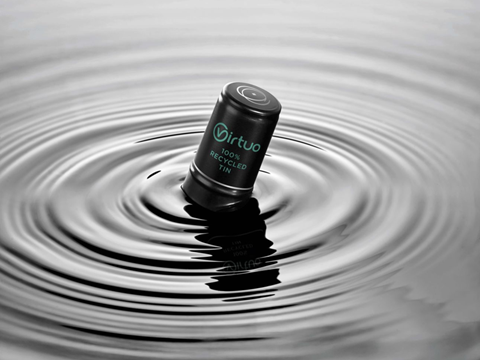
Crealis Group’s Rivercap brand has unveiled a 100% recycled tin cap for wine and spirits bottles, said to be up to 99% recyclable and lower the carbon footprint of conventional tin capsules by 61%.
The Virtuo cap is manufactured from a single ingot of recycled pewter. Sourced predominantly from the electronics industry, the recyclate is believed to offer the same purity and performance as virgin tin while maintaining bottling efficiency and durability requirements.
Like other pewter caps, Virtuo can be embossed and debossed with ‘top-of-the-range’ finishes for personalization between brands. It is believed to offer ‘depth of colour’ and ‘remarkable tactile qualities’ among its decorative qualities.
Crealis Group anticipates that the cap will combine circularity, high-quality, and aesthetics, having derived its name from the word ‘virtuoso’ – a term the company links to ‘excellence in craftmanship, irreproachable ethics and perfect harmony between aesthetics and sustainability’.
The solution is anticipated to meet demand from brands and consumers for environmentally conscious packaging designs.
“Sustainability is not just a promise; it’s a concrete reality that we integrate at every stage of our value chain,” says Isabelle Gruard, Marketing and Communications Director of the Crealis Group. “Virtuo is tangible proof of this.”
In a similar development, Amcor Capsules announced last summer that its tin capsules and sparkling foils contained over 90% recycled tin. This development sought to lower the company’s cradle-to-gate carbon emissions by up to 70%, achieving 1.6 tons of CO2e per ton of tin.
Eviosys also aimed to save 33% of CO2 emissions with a lighter version of its metal Horizon overcap. Described as ‘infinitely recyclable’, it claims to avoid deforming or turning yellow over time like plastic overcaps, instead preserving edible products and cutting down on food waste.
Kewpie Corporation has also teamed up with Refinverse, Mitsubishi Chemical Corporation, Toyo Seikan Group Holdings, Kasumi Co., and the city of Kashima to pilot recycled salad dressing caps. It claims to be the first project in Japan to derive resin from recycled plastics converted into oil via supercritical water.
If you liked this story, you might also enjoy:
Reuse vs. single use – which is better for the environment?
Sustainable Innovation Report 2025: Current trends and future priorities
What can the world learn from South Korea’s world-leading performance in plastics circularity?














No comments yet